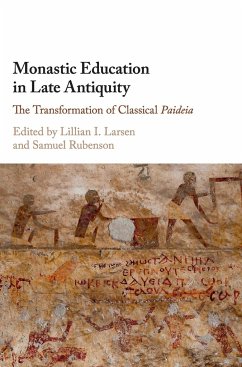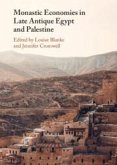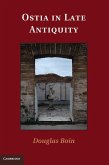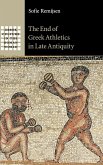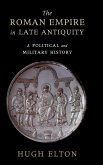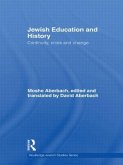Monastic Education in Late Antiquity
Herausgeber: Larsen, Lillian I.; Rubenson, Samuel
Monastic Education in Late Antiquity
Herausgeber: Larsen, Lillian I.; Rubenson, Samuel
- Gebundenes Buch
- Merkliste
- Auf die Merkliste
- Bewerten Bewerten
- Teilen
- Produkt teilen
- Produkterinnerung
- Produkterinnerung
Redefines the role assigned education in the history of monasticism, by re-situating monasticism in the history of education.
Andere Kunden interessierten sich auch für
![Literate Education in the Hellenistic and Roman Worlds Literate Education in the Hellenistic and Roman Worlds]() Teresa MorganLiterate Education in the Hellenistic and Roman Worlds154,99 €
Teresa MorganLiterate Education in the Hellenistic and Roman Worlds154,99 €![Monastic Economies in Late Antique Egypt and Palestine Monastic Economies in Late Antique Egypt and Palestine]() Monastic Economies in Late Antique Egypt and Palestine137,99 €
Monastic Economies in Late Antique Egypt and Palestine137,99 €![Ostia in Late Antiquity Ostia in Late Antiquity]() Douglas BoinOstia in Late Antiquity105,99 €
Douglas BoinOstia in Late Antiquity105,99 €![The End of Greek Athletics in Late Antiquity The End of Greek Athletics in Late Antiquity]() Sofie RemijsenThe End of Greek Athletics in Late Antiquity131,99 €
Sofie RemijsenThe End of Greek Athletics in Late Antiquity131,99 €![The Roman Empire in Late Antiquity The Roman Empire in Late Antiquity]() Hugh EltonThe Roman Empire in Late Antiquity101,99 €
Hugh EltonThe Roman Empire in Late Antiquity101,99 €![Jewish Education and History Jewish Education and History]() Moshe AberbachJewish Education and History211,99 €
Moshe AberbachJewish Education and History211,99 €![Classics and Prison Education in the US Classics and Prison Education in the US]() Classics and Prison Education in the US74,99 €
Classics and Prison Education in the US74,99 €-
-
-
Redefines the role assigned education in the history of monasticism, by re-situating monasticism in the history of education.
Hinweis: Dieser Artikel kann nur an eine deutsche Lieferadresse ausgeliefert werden.
Hinweis: Dieser Artikel kann nur an eine deutsche Lieferadresse ausgeliefert werden.
Produktdetails
- Produktdetails
- Verlag: Cambridge University Press
- Seitenzahl: 410
- Erscheinungstermin: 18. April 2019
- Englisch
- Abmessung: 250mm x 175mm x 27mm
- Gewicht: 884g
- ISBN-13: 9781107194953
- ISBN-10: 1107194954
- Artikelnr.: 50561343
- Herstellerkennzeichnung
- Libri GmbH
- Europaallee 1
- 36244 Bad Hersfeld
- gpsr@libri.de
- Verlag: Cambridge University Press
- Seitenzahl: 410
- Erscheinungstermin: 18. April 2019
- Englisch
- Abmessung: 250mm x 175mm x 27mm
- Gewicht: 884g
- ISBN-13: 9781107194953
- ISBN-10: 1107194954
- Artikelnr.: 50561343
- Herstellerkennzeichnung
- Libri GmbH
- Europaallee 1
- 36244 Bad Hersfeld
- gpsr@libri.de
Part I. The Language of Education: 1. Early monasticism and the concept of
a 'School' Samuel Rubenson; 2. Translating paideia: education in the Greek
and Latin versions of the Life of Anthony Peter Gemeinhardt; 3. Paideia,
piety and power: Emperors and Monks in Socrates' Church History Andreas
Westergren; Part II. Elementary Education and Literacy: 4. The Educational
and Cultural Background of Egyptian Monks Roger Bagnall; 5. 'Excavating the
Excavations' of early monastic education Lillian I. Larsen; 6. Homer and
Menandri Sententiae in Upper Egyptian monastic settings Anastasia Maravela;
Part III. Grammar and Rhetoric: 7. The school of Didymus the blind in the
light of the Tura find Blossom Stefaniw; 8. Affecting rhetoric: the
adoption of Ethopoeia in Evagrius of Pontus' ascetic program Ellen
Muehlberger; 9. Classical education in sixth century Coptic monasticism:
the example of Rufus of Shotep Mark Sheridan; Part IV. Philosophy: 10. The
virtue of being uneducated: attitudes towards classical paideia in early
monasticism and ancient philosophy Henrik Rydell Johnsén; 11. Plato between
school and cell: biography and competition in the fifth-century
philosophical field Arthur Urbano; 12. Pythagorean traditions in Early
Christian asceticism Daniele Pevarello; Part V. Manuscript and Literary
Production: 13. Textual fluidity and authorial revision: the case of
Cassian and Palladius Britt Dahlman; 14. Production, distribution, and
ownership of books in the monasteries of Upper Egypt: the evidence of the
Nag Hammadi Colophons Hugo Lundhaug and Lance Jenott; 15. Greek thought,
Arabic culture: approaching the Arabic recensions of the Apophthegmata
Patrum Jason Zaborowski.
a 'School' Samuel Rubenson; 2. Translating paideia: education in the Greek
and Latin versions of the Life of Anthony Peter Gemeinhardt; 3. Paideia,
piety and power: Emperors and Monks in Socrates' Church History Andreas
Westergren; Part II. Elementary Education and Literacy: 4. The Educational
and Cultural Background of Egyptian Monks Roger Bagnall; 5. 'Excavating the
Excavations' of early monastic education Lillian I. Larsen; 6. Homer and
Menandri Sententiae in Upper Egyptian monastic settings Anastasia Maravela;
Part III. Grammar and Rhetoric: 7. The school of Didymus the blind in the
light of the Tura find Blossom Stefaniw; 8. Affecting rhetoric: the
adoption of Ethopoeia in Evagrius of Pontus' ascetic program Ellen
Muehlberger; 9. Classical education in sixth century Coptic monasticism:
the example of Rufus of Shotep Mark Sheridan; Part IV. Philosophy: 10. The
virtue of being uneducated: attitudes towards classical paideia in early
monasticism and ancient philosophy Henrik Rydell Johnsén; 11. Plato between
school and cell: biography and competition in the fifth-century
philosophical field Arthur Urbano; 12. Pythagorean traditions in Early
Christian asceticism Daniele Pevarello; Part V. Manuscript and Literary
Production: 13. Textual fluidity and authorial revision: the case of
Cassian and Palladius Britt Dahlman; 14. Production, distribution, and
ownership of books in the monasteries of Upper Egypt: the evidence of the
Nag Hammadi Colophons Hugo Lundhaug and Lance Jenott; 15. Greek thought,
Arabic culture: approaching the Arabic recensions of the Apophthegmata
Patrum Jason Zaborowski.
Part I. The Language of Education: 1. Early monasticism and the concept of
a 'School' Samuel Rubenson; 2. Translating paideia: education in the Greek
and Latin versions of the Life of Anthony Peter Gemeinhardt; 3. Paideia,
piety and power: Emperors and Monks in Socrates' Church History Andreas
Westergren; Part II. Elementary Education and Literacy: 4. The Educational
and Cultural Background of Egyptian Monks Roger Bagnall; 5. 'Excavating the
Excavations' of early monastic education Lillian I. Larsen; 6. Homer and
Menandri Sententiae in Upper Egyptian monastic settings Anastasia Maravela;
Part III. Grammar and Rhetoric: 7. The school of Didymus the blind in the
light of the Tura find Blossom Stefaniw; 8. Affecting rhetoric: the
adoption of Ethopoeia in Evagrius of Pontus' ascetic program Ellen
Muehlberger; 9. Classical education in sixth century Coptic monasticism:
the example of Rufus of Shotep Mark Sheridan; Part IV. Philosophy: 10. The
virtue of being uneducated: attitudes towards classical paideia in early
monasticism and ancient philosophy Henrik Rydell Johnsén; 11. Plato between
school and cell: biography and competition in the fifth-century
philosophical field Arthur Urbano; 12. Pythagorean traditions in Early
Christian asceticism Daniele Pevarello; Part V. Manuscript and Literary
Production: 13. Textual fluidity and authorial revision: the case of
Cassian and Palladius Britt Dahlman; 14. Production, distribution, and
ownership of books in the monasteries of Upper Egypt: the evidence of the
Nag Hammadi Colophons Hugo Lundhaug and Lance Jenott; 15. Greek thought,
Arabic culture: approaching the Arabic recensions of the Apophthegmata
Patrum Jason Zaborowski.
a 'School' Samuel Rubenson; 2. Translating paideia: education in the Greek
and Latin versions of the Life of Anthony Peter Gemeinhardt; 3. Paideia,
piety and power: Emperors and Monks in Socrates' Church History Andreas
Westergren; Part II. Elementary Education and Literacy: 4. The Educational
and Cultural Background of Egyptian Monks Roger Bagnall; 5. 'Excavating the
Excavations' of early monastic education Lillian I. Larsen; 6. Homer and
Menandri Sententiae in Upper Egyptian monastic settings Anastasia Maravela;
Part III. Grammar and Rhetoric: 7. The school of Didymus the blind in the
light of the Tura find Blossom Stefaniw; 8. Affecting rhetoric: the
adoption of Ethopoeia in Evagrius of Pontus' ascetic program Ellen
Muehlberger; 9. Classical education in sixth century Coptic monasticism:
the example of Rufus of Shotep Mark Sheridan; Part IV. Philosophy: 10. The
virtue of being uneducated: attitudes towards classical paideia in early
monasticism and ancient philosophy Henrik Rydell Johnsén; 11. Plato between
school and cell: biography and competition in the fifth-century
philosophical field Arthur Urbano; 12. Pythagorean traditions in Early
Christian asceticism Daniele Pevarello; Part V. Manuscript and Literary
Production: 13. Textual fluidity and authorial revision: the case of
Cassian and Palladius Britt Dahlman; 14. Production, distribution, and
ownership of books in the monasteries of Upper Egypt: the evidence of the
Nag Hammadi Colophons Hugo Lundhaug and Lance Jenott; 15. Greek thought,
Arabic culture: approaching the Arabic recensions of the Apophthegmata
Patrum Jason Zaborowski.

